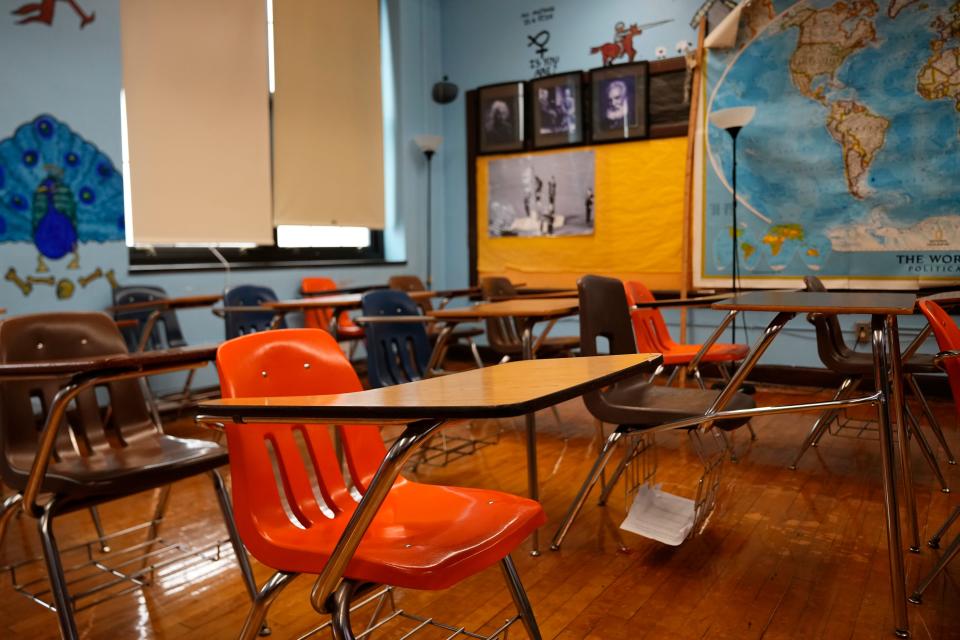We are failing our students. To develop a responsible citizenry, return to the classics
Young Americans are less politically engaged than ever. Fewer than half of 18-to-24-year-olds are planning to vote in this fall's election, according to the most recent national youth poll from the Institute of Politics at the Harvard Kennedy School.
This trend is worrying. And the educational status quo deserves some of the blame. Too often, our schools are not fulfilling their primary role of teaching students how to become responsible citizens who can think critically.
That needs to change. We must put the liberal arts — and the ideals like truth, beauty and goodness they impart — at the center of our pedagogy. Doing so will help students grow into adults who possess the courage, wisdom and discipline to engage in self-governance.

Math and reading scores are at their lowest levels in decades
Consider that reading and math scores for 13-year-olds dropped to their lowest level in decades in 2023. But raw numbers aren't the only problem. Students are leaving school without an understanding of what it means to be a citizen of a creedal nation like the United States. The Harvard youth poll also found that one-third of 18-to-24-year-olds have "no intention" of participating in civic activities such as donating or volunteering.
The Brilla network of public charter schools is trying to change that. We run seven elementary and middle schools in the Bronx and Paterson, New Jersey, that give children from low-income and historically underserved groups, most of whom are Black and Hispanic, the kind of classically inspired education that has served as the foundation of citizenship for centuries.
In addition to math and science, we teach the history, literature and art of Western Civilization, from Plato to the Harlem Renaissance. Students then explore how virtues like justice and courage transcend time and cultures — and in doing so, deepen their connection to others and their understanding of eternal truths.
This method of schooling should not be the sole province of those privileged enough to go to private prep school.
It starts with teaching students how to learn. That may not sound controversial, but the conventional model prioritizes what students learn. That content is often career-focused and dependent on new technologies.
Practical skills are important. But they can feel meaningless if they don't equip us with the ability to keep learning for a lifetime.
Opinion: Columbia cancels graduation ceremony because of student protests. It's the wrong choice.
Liberal arts deliver elevated outcomes
The content of the classical approach is derived from the Western canon. Schools engage their students in discussion of great works of literature, art and philosophy. Even more important, they teach the ability to engage in rational dialogue with peers.
In American politics today, opposing parties seem to have lost the capacity to consider opposing viewpoints, the humility to recognize the merit in others' ideas, and the ability to persuasively argue their own case. That puts our future as a democracy at risk — unless we change course.
In classically inspired schools, students progress through a system with ancient roots known as the trivium: grammar, logic and rhetoric. At the youngest ages, they learn facts, vocabulary and basic mathematical rules. As they mature, they learn how to reason, debate and test hypotheses. In high school they learn to communicate well, so that they can express their own ideas through oral and written work.
This approach is supported by research into cognitive neuroscience and how the brain learns. New learning is strongly influenced by what students already know, so students are best prepared to think critically about complex topics once they've mastered foundational skills like logic and rhetoric.
Outcomes data show that this system is effective. Though classically inspired schools don't "teach to the test," students still score well on standardized exams. One research paper found that a group of classical-model charter schools in New York, Washington, D.C., and Nashville, Tennessee — all of which had majority-minority student bodies — posted state test scores that either matched or surpassed the traditional public school average in their districts.
Between 2019 and 2023, more than 260 new classical schools were established across the country. Growth is expected to continue through this decade. Many of these schools — like Brilla — are secular, and others are religious. We've found that this ancient approach to education can be adapted, modernized and made responsive to the families and communities we serve.
We need not look too far back into our history to see what happens when citizens lose the ability to engage in dialogue and compromise. To ensure the future prosperity of our nation, our schools must recommit to teaching those skills.
Stephanie Saroki de García is co-founder and managing director of Seton Education Partners, which launched and currently operates 10 Catholic and public charter grade schools in four states, including the Brilla schools. Michael Carbone is the chief of schools for the Brilla Schools Network.
This article originally appeared on NorthJersey.com: To develop a responsible citizenry, return to the classics

